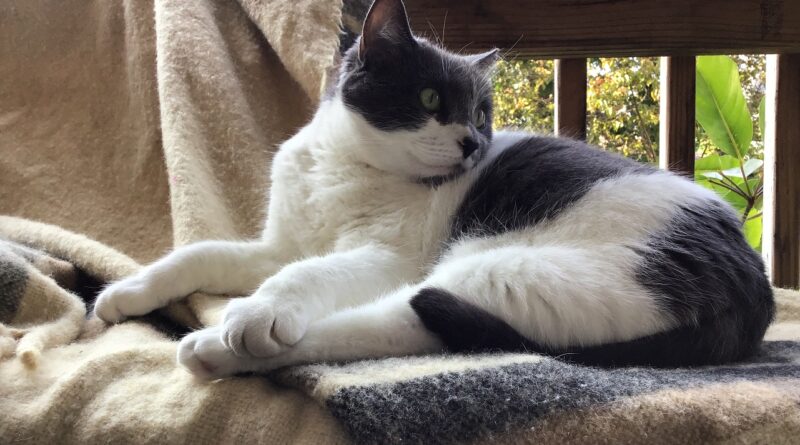Pet Wellness and Happiness R Us
Podcast: Play in new window | Download (Duration: 1:45:50 — 49.2MB)
Subscribe: Apple Podcasts | Spotify | Android | iHeartRadio | Podchaser | Email | TuneIn | RSS | More
(November 8, 2020) A zillion years and three radio stations ago, I shared the airwaves with a guy named Steve Dale. We had back-to-back shows at a place called Gargantua Radio. Some of you might know it as WGN. As I do now, I talked about gardening and the environment, with, at that time, a little more emphasis on gardening. Steve was the pet guru and activist. He still is. Today, we’re getting the band back together, in what I call a “Pet Wellness and Happiness R Us” segment. That’s why I’m featuring a photo of our show mascot, the inimitable La Gata The Cat (which is redundant).
Skip to a specific segment in this podcast
2:17 Certified animal behavior consultant Steve Dale,
34:00 Jodie Wiederkehr from Chicago Alliance for Animals
1:03:47 Juanita Irizarry, Executive Director of Friends of the Parks
1:34:14 Meteorologist Rick DiMaio
First, a little more about Steve from his website.
 Steve Dale, certified animal behavior consultant (CABC), has reached more pet owners over the past few decades than any other pet journalist in America.
Steve Dale, certified animal behavior consultant (CABC), has reached more pet owners over the past few decades than any other pet journalist in America.
He is the host of two nationally syndicated radio shows, Steve Dale’s Pet World and The Pet Minute (together heard on more than 100 radio stations, syndicated Black Dog Radio Productions, since 2005). He’s also a special contributor at WGN Radio, Chicago, and program host of Steve Dale’s Pet World (since 1997). He formerly hosted the nationally broadcast Animal Planet Radio.
For 21 years, his twice weekly newspaper column was syndicated by the Chicago Tribune. Steve was a contributing editor for USA Weekend (2002 to 2014), and regular columnist at Cat Fancy magazine (2006 to 2014). He has written for a long list of magazines, from People to Dog World (where he was a columnist).
In addition, he has written or contributed to a number of books, and has received a boatload of awards. They include the AVMA Humane Award (the only AVMA honor bestowed to a non-veterinarian), Editor and Publisher syndicated newspaper Feature Writer of the Year Award and the inaugural AVMA Excellence in Media Award, which he received in August of this year.
Putting puppy mills out of business
Among the things we will discuss during our pet wellness segment today is the war against puppy mills. The Humane Society of the United States describes puppy mills this way.
A puppy mill is an inhumane high-volume dog breeding facility that churns out puppies for profit, ignoring the needs of the pups and their mothers. Dogs from puppy mills are often sick and unsocialized. Puppy mills commonly sell through internet sales, online classified ads, flea markets and pet stores. In fact, the majority of puppies sold in pet stores and online are from puppy mills. Responsible breeders will be happy to meet you in person and show you where the puppy was born and raised—and where their mom lives too.
HSUS also has the disturbing numbers.
-
10,000 puppy mills are estimated to be currently active in the United States.
-
194,000+ dogs are kept solely for breeding in USDA-licensed facilities. Sadly, a license is not a guarantee of a breeder’s quality.
-
2 million puppies are sold each year after originating from a puppy mill.
The Puppy Mill Project, a Chicago-based organization, says that the U.S. Government, unfortunately, does little to prevent puppy mills from operating.
In order to sell to a pet store, a breeder must obtain a USDA license. The fact that the breeder has a USDA license does not provide an assurance of quality or humane breeding. Instead, it means that it is held only to very minimal standards of care and is most likely a puppy mill. To learn why a USDA license does not mean that you are purchasing a responsibly-bred pet, click here. Responsible breeders do not sell to pet stores, and are prohibited from doing so by their breed club guidelines.
Fortunately, the trend, as Steve Dale reports, is away from those operations.
More than 380 cities across the U.S. and Canada now have restrictions on the retail sales of dogs and cats. In Texas, Austin, Waco, Fort Worth, El Paso and The Colony — a suburb of Dallas — ban all retail sales of dogs and cats at pet stores.
In Illinois, there are now 20 cities and two counties as the DuPage County Board also just passed an ordinance that declares puppy and kitten mills a public nuisance along with the stores that peddle them. The new language gives the county more authority to stop the sale of mill puppies in stores in unincorporated DuPage. Cook County already has a law in place. And Freeport, IL enacted their ban in October.
Chicago’s actions against puppy mills
In 2014, Chicago City Council passed a law against puppy mills, but the wording was not strong enough, and that left three stores in the City continuing utilize those mills. In July, Chicago’s alders moved to fix the problem.
On Monday, the City Council’s Committee on Health and Human Relations moved to close a legal loophole that has allowed pet shops to get around that ordinance by forming what Hopkins has called “phony rescue organizations.”
Marc Ayers, Illinois director for the Humane Society of the United States, noted that Iowa’s attorney general recently cracked down on “sham rescues.”
“Two of those fake rescues that they have just shut down were notorious for selling to the three remaining stores violating the intent of the Chicago ordinance,” Ayers said.
However, while the revised ordinance passed the committee, it has still not been acted upon by the whole council. Another person who has been thrown herself into the puppy mill fight is Jodie Wiederkehr. You might remember her as campaign director for the Chicago Alliance for Animals (CAA), and founder and executive director of the Center for Ethical Science (CFES).
She has been on the show a number of times, mainly to report on her campaign to bring an end to the use of carriage horses in Chicago. Last April, after years of monitoring the violation of city rules regarding treatment of horses, Chicago City Council finally acted, voting 46-4 to ban horse-drawn carriages. Wiederkehr says that, even though the carriages were allowed to operate until the end of the year, they have by and large disappeared.
She says that CAA has launched petitions to shut down the remaining pet shops that allegedly obtain their animals from puppy mills: Pocket Puppies (in Alderwoman Michele Smith’s ward), Pet Luv Pet Center (in Alderman Derrick Curtis’ ward), and Park Pet Shop (in Alderman Matthew O’Shea’s ward)
Other pet wellness issues
But we’re not going to spend the entire hour talking about puppy mills. Here are some other stories that Steve Dale has written about lately.
- Latest on SARS CoV-2 and COVID-19 and Pets
- Pet Ownership in Europe and U.S. on the Rise
- Animal Abuse MUST Be a Felony
- Pet-Safe Lawns
- Penn Vet Dogs Find Spotted Lanternfly Eggs
And who knows what else? Get your pet wellness questions ready and send them to us via email (mike@mikenowak.net), Facebook, Twitter, Instagram or YouTube chat.
Stop polluting Chicago’s southeast side!
At the end of August, I wrote this in a blog post.
Whether the issue is petcoke storage or dirty industries or expanding a toxic dump at the mouth of the Calumet River on the shores of Lake Michigan or general vulnerability to environmental toxins, the southeast side of Chicago is almost always near or at the top of the list of places you wouldn’t want to live if you had a choice. During this year’s Earth Day, celebrated in the midst of a pandemic, activists called upon Chicagoans to save the southeast side.
After this month’s demolition of the old Crawford Coal smokestack that blanketed Little Village with a cloud of thick dust, Lincoln Park residents began calling on Mayor Lightfoot to shut down metal scrapper General Iron. While that fight continues, General Iron is planning to move to to the East Side at the end of this year— a move Gina Ramirez, co-chair of The Southeast Side Coalition to Ban Petcoke, said is a slap in the face to area residents.
“It’s moving from a wealthy white community to a low-income minority community, so it’s enriching the North Side community at the expense of the residents of the Southeast Side,” Ramirez said. “… It’s a clear symbol that this neighborhood is a sacrifice zone.”
Gina Ramirez is Midwest Outreach Manager for the NRDC. She and Peggy Salazar, Executive Director of the Southeast Environmental Task Force (SETF), were on the show that day to talk about a couple of environmental issues, including the tone-deaf plan to extend the life of a Confined Disposal Facility (CDF) in Calumet Harbor, at the confluence of Lake Michigan and the Calumet River.
This is such a bad idea, in so many ways, that it makes you wonder what the U.S. Army Corps of Engineers and the Lori Lightfoot administration are thinking…or if they’re thinking at all. It was the subject of a recent online session called “CDF What? A Pollution Dump on the Lakefront,” which was part of the annual Friends of the Parks. conference.
WTTW, reporting on that session, wrote,
The CDF, which stores polluted sediment dredged from the Calumet River and the Cal-Sag Channel, was constructed in 1984. The Illinois General Assembly granted use to the Corps with the idea that, once full, the CDF would be topped off and handed over to the Chicago Park District for redevelopment.
The 45-acre site is expected to reach capacity by 2022. But instead of ceasing operation and turning over the property, the Corps’ has decided to extend the CDF’s life via a 22-foot vertical expansion. The Corps estimates that approximately 1.3 million cubic yards of additional sediment — a mix of contaminated soil and water — would be dumped onto the CDF over the next 20 years.
“They’re going to create another mountain of dredge in the middle of the 10th Ward and its parks and lakefront,” environmental lawyer Patricia Sharkey said Saturday.
Indeed, it seems that way. In an age of uncertain lake levels and climate-change-related weather events, what could possibly go wrong? An expanding the CDF is squandering an opportunity to create more parkland for Chicago.
That’s why Executive Director Juanita Irizarry of Friends of the Parks returns to our show. In mid-August FOTP submitted comments to the US Army Corps of Engineers challenging their Final Dredged Material Management Plan and Environmental Impact Statement. If you want to get into the weeds of the arguments, I suggest you click onto that link. Or you can tune into our live stream this morning.
BTW, if we get a chance, we we also catch up on what’s happening with the Obama Presidential Center in Jackson Park. Another issue is the The North Lake Shore Drive: Redefine the Drive project. We’ll see what we can fit in.


